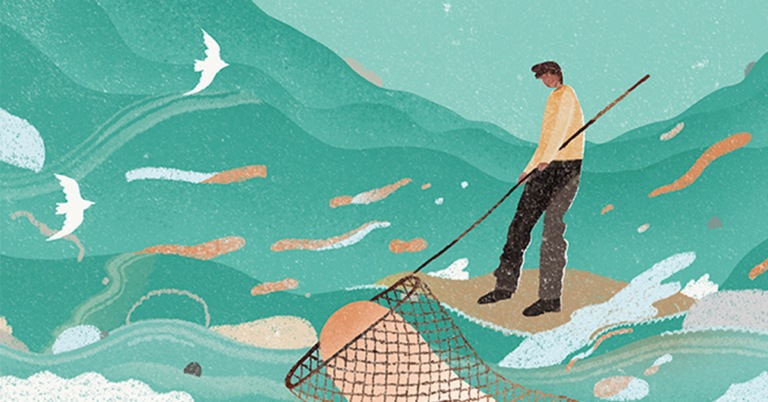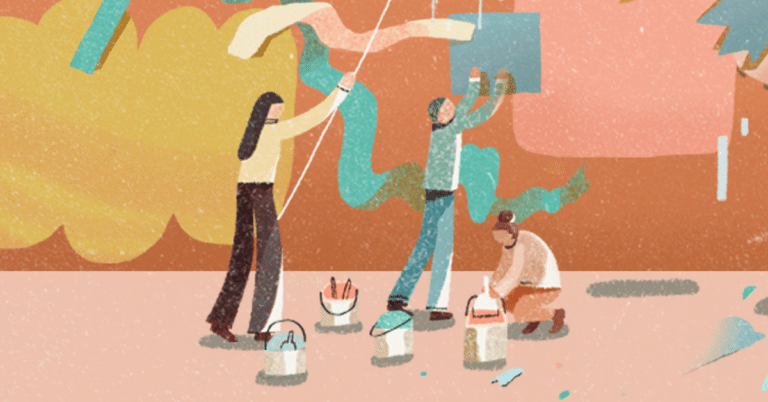Living the Questions
We live in a world in love with the form of words that is an opinion and the way with words that is an argument. Yet it is a deep truth in life — as in science — that each of us is shaped as much by the quality of the questions we are asking as by the answers we have it in us to give. Precisely at a moment like this, of vast aching open questions and very few answers we can agree on, our questions themselves become powerful tools for living and growing.

Transcript
Hello again.
Today, we are going to talk about “living the questions.” This is another notion, really a way of thinking, that becomes a way of seeing and moving through the world. And this one is inspired by the German poet Rainer Maria Rilke, and it is anchored in a passage from his Letters to a Young Poet in the early 20th century.
He wrote, “Be patient towards all that is unsolved in your heart and try to love the questions themselves as if they were locked rooms or books written in a very foreign language. Don’t search for the answers, which could not be given to you now because you would not be able to live them. And the point is to live everything. Live the questions now. Perhaps then, someday far in the future, you will gradually, without even noticing it, live your way into the answer.”
Rilke’s writing entered my life in my early 20s. I spent part of that in divided Berlin. And I think that when I was young, what it spoke to in me was having grown up in a world where there were answers for everything. And the answers felt too small. This gave me permission to keep stretching the way I felt called to stretch.
But it has stayed with me my entire life. Across time, this has become a discipline woven into my work and my sense of calling, and into the community of conversation and searching and living that is On Being. And it has never felt more directly useful and relevant than in this post-2020 world. I’ve thought a lot in these years about how Rilke, too, was a citizen of a young century with spectacular and devastating potentials for creating and for destroying. And on some level, all of the great challenges before us — ecological, racial, economic, political — are all vast, aching, open questions for which we do not have answers and will not have anything like answers anytime soon. So I find myself turning anew to this wisdom that when we are in this situation, we are called to honor and live the questions themselves.
My love for this teaching and the seriousness with which I take it rests in part on my deep reverence for the gravity and the power of questions in human life. I think that this is undervalued in a culture that is in love with the form of words that is an answer — and the way with words that is an argument.
But I also find a question to be a mighty form of words, and I have learned a few things about questions. I have learned that questions elicit answers in their likeness — that answers rise or fall to the questions they meet. We’ve all seen this. We’ve all experienced it. It’s very hard to respond to a combative question with anything but a combative answer. It’s almost impossible to transcend a simplistic question with anything but a simplistic answer. But the opposite is also true: it’s hard to resist a generous question. This is a skill that needs relearning, but I believe that we all have it in us to ask questions that invite, that draw forth searching in dignity and revelation. There is something redemptive and lifegiving about asking a better question.
And it is a deep truth in science, and also in each of our lives, that we are shaped as much by the quality of the questions we’re asking at any given point as by the answers we have it in us to give. Those moments in our lives when a better quality of question rises up in us, stops us in our tracks — those are pivot points. Those are moments where discovery and new possibility break in.
So the invitation here is to engage the adventure of a new curiosity and reverence for the questions that are alive in you, the questions alive in the world that you feel drawn to. This move that I’m describing is intimate and it is civilizational all at the same time. It’s important to get conscious and aware of the fact that the questions that we have been trained to ask, to trade in — the questions we reflexively ask, at least in Western culture, are not suited to the fact that we have a world to remake. We are very fluent in blunt, materialistic, capitalist questions: What? How soon? How much? What I hope that we can learn to do is add questions of moral imagination to that mix: questions like “Why?” and “To what human effect?” and “How much is enough?”
I have also taken living the questions as a practical life exercise, a spiritual discipline, and I commend that to you. Formulate a question that is rolling around in your life or in that boundary between what is personal and what is public or civilizational. Write it down, hone it, and make a commitment to it. Commit to having it over your shoulder, in your ear, as you move through your life. See what it invites you to see and to move towards and to move away from. I would start by writing this down and giving it a month, or giving it a year. I have found that if you are faithful to living a question, that question will be faithful back to you.
So try it, and I’ll see you here next time.







Reflections